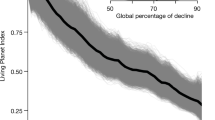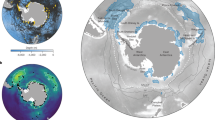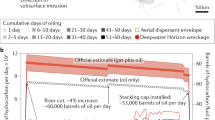A near-miss ecological disaster still left a sinister aftermath for these giant lizards.
Abstract
An oil tanker ran aground on the Galapagos island of San Cristóbal on 17 January 2001, spilling roughly three million litres of diesel and bunker oil. The slick started to spread westwards1 and was dispersed by strong currents, so only a few marine animals were killed immediately as a result. Here we draw on long-term data sets gathered before the spill to show that a population of marine iguanas (Amblyrhynchus cristatus) on Santa Fe island suffered a massive 62% mortality in the year after the accident, due to a small amount of residual oil contamination in the sea. Another population on the more remote island of Genovesa was unaffected.
This is a preview of subscription content, access via your institution
Access options
Subscribe to this journal
Receive 51 print issues and online access
$199.00 per year
only $3.90 per issue
Buy this article
- Purchase on Springer Link
- Instant access to full article PDF
Prices may be subject to local taxes which are calculated during checkout

HEIDI SNELL

Similar content being viewed by others
References
Wikelski, M., Romero, L. M. & Snell, H. L. Science 292, 437–438 (2001).
Paine, R. T. et al. Annu. Rev. Ecol. Syst. 27, 197–235 (1996).
Sea Technol. 42, 74 (2001).
van Tamelen, P. G., Stekoll, M. S. & Deysher, L. Mar. Ecol. Prog. Ser. 160, 265–277 (1997).
Wikelski, M. & Trillmich, F. Evolution 51, 922–936 (1997).
Romero, L. M. & Wikelski, M. Proc. Natl Acad. Sci. USA 98, 7366–7370 (2001).
Wikelski, M., Gall, B. & Trillmich, F. Oecologia 94, 373–379 (1993).
Mackie, R. I., Rycyk, M., Ruemmler, R. L., Aminov, R. I. & Wikelski, M. Phys. Biochem. Zool. (submitted).
Prichard, A. K., Roby, D. D., Bowyer, R. T. & Duffy, L. K. Chemosphere 35, 1531–1548 (1997).
Ormseth, O. A. & Ben-David, A. J. Comp. Physiol. B 170, 419–428 (2000).
Fowler, G. S., Wingfield J. C. & Boersma, D. P. Auk 112, 382–389 (1995).
Author information
Authors and Affiliations
Corresponding author
Ethics declarations
Competing interests
finanical, declared none; M.W. and the Galapagos National Park are in legal dispute with Petroecuador.
Rights and permissions
About this article
Cite this article
Wikelski, M., Wong, V., Chevalier, B. et al. Marine iguanas die from trace oil pollution. Nature 417, 607–608 (2002). https://doi.org/10.1038/417607a
Issue Date:
DOI: https://doi.org/10.1038/417607a
This article is cited by
-
A pilot study to estimate the population size of endangered Galápagos marine iguanas using drones
Frontiers in Zoology (2023)
-
Trace elements fingerprint of feathers differs between breeding and non-breeding areas in an Afro-Palearctic migratory bird, the barn swallow (Hirundo rustica)
Environmental Science and Pollution Research (2021)
-
Review of petroleum toxicity in marine reptiles
Ecotoxicology (2021)
-
Review of petroleum toxicity and identifying common endpoints for future research on diluted bitumen toxicity in marine mammals
Ecotoxicology (2021)
-
Cascading effects of thermally-induced anemone bleaching on associated anemonefish hormonal stress response and reproduction
Nature Communications (2017)
Comments
By submitting a comment you agree to abide by our Terms and Community Guidelines. If you find something abusive or that does not comply with our terms or guidelines please flag it as inappropriate.



